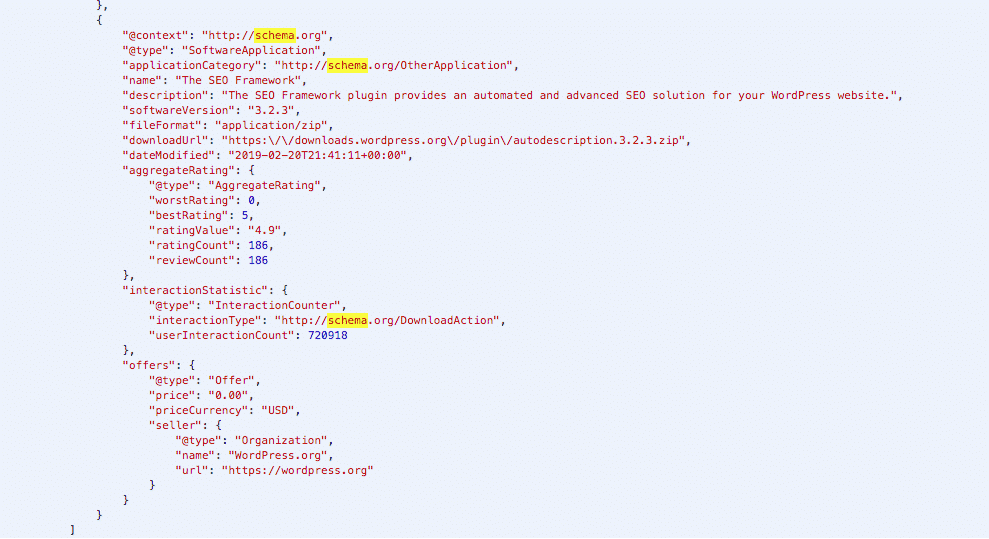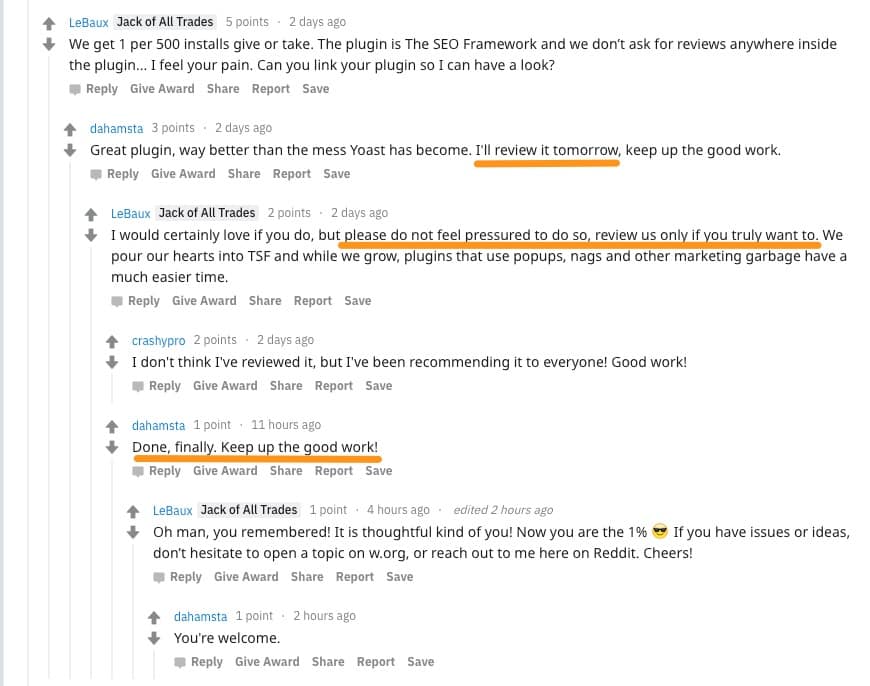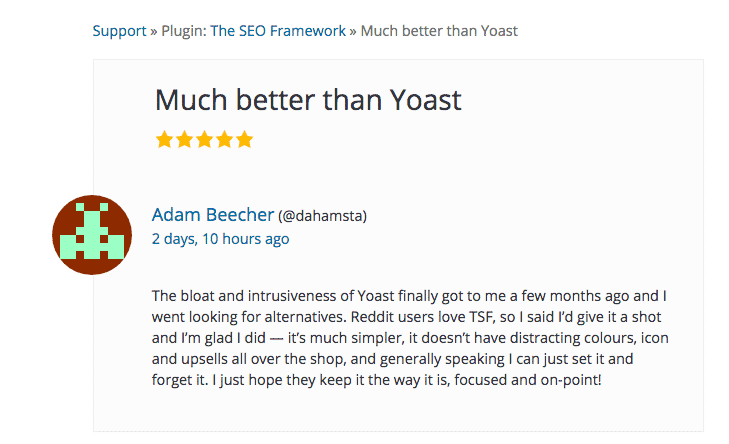The truth is out there: very few users leave a review for a WordPress plugin. All plugin developers know it’s darn hard to get that 5-star review for their “baby”.
In fact, data shows that the average percentage of users who leave reviews for a popular WordPress plugin is 0.2%. That means, for every 1000 users, only 2 will likely leave a review on the WordPress repository.
Not the most exciting statistical data, I know.
But look at it this way:
If you’re the owner of a WordPress plugin, this data tells you that 99.8% of your users are out there waiting to leave a review if asked properly. We’ll see how in a second.
Being able to collect (positive) reviews is important for a plugin developer because:
It’s your way to attract new users
The very first aspect prospect users look at are your reviews. We all look at those stars and yellow bars the second the page loads. I’m not saying it’s the only thing users pay attention to but an important one, for sure.
It’s your way to rank higher in the WordPress repository
The WordPress repository search algorithm factors in different elements you can control/influence and the average rating of your plugin is one of them. Therefore, the more 5-star reviews you’re able to collect, the better your chances to show higher and more frequently on the result pages.
It helps your clickthrough rate on Google

The ratings and reviews you accumulate on your plugin page on the WordPress repository will show on Google SERP pages as well because of schema markup. See here:

And, as you already imagined, the more stars a potential user will see while searching for a plugin on Google, the more likely they’ll click that result to check your plugin.
It counterbalances the bad ones
I don’t think I need to add more here :)
It reinforces your brand reputation
Higher-rated plugins can take advantage of a much stronger social proof than those with fewer reviews. On top of that, a nice review provides you with a quick way to generate social updates you could start piling on regularly to reach even further prospect users.
Given the importance of reviews, I engaged with some well-known WordPress plugin developers, who successfully were able to improve their review-to-install ratio, and asked what they think is the most effective way to earn positive reviews.
And here’s what I discovered…
The #1 overlooked way to increase your review-to-user ratio: ask for it
It sounds simplistic, but it’s all you need to do as a starting point. Don’t ever forget this smashing truth:
“If you don’t ask, the answer is already no.”
So when you should do the ask and how?
When to ask your users to leave a 5-star review for your WordPress plugin
The most powerful trigger you have is the reciprocity principle, which is one of the 6 principles of persuasion highlighted by Dr. Robert Cialdini‘s famous book “Influence”:
This is a short video that perfectly explains how the reciprocity principle works.
The takeaway is that we, as human beings, can get positively influenced by other people’s actions.
In the user-plugin developer relationship, it’s should be you the one who provides at first “something” that’s personalized (instead of generic), unexpected (instead of anticipated), useful (instead of a worthless answer) to your plugin users. You’d want to do that to instill in them a feeling that they “owe you” in a way.
And that occurs when you do your support hours. Here you have the biggest opportunity, as Nick Duncan, WordPress developer behind WP Live Chat Support, shared with me:
“There may be a correlation between the review-to-active-user ratio and the support-to-active-user-ratio. The more support tickets a company gets, the more opportunities they have for a review, once they are happily dealt with.
How asking for positive reviews after closing a support ticket proved to work:
Daniel Iser, WP Popup Maker plugin
He told me:
“In the first 18 months or so, we collected roughly 600 5-star reviews for Popup Maker. All of them came from closing support tickets with a request for review. I’d say 1 out of 4 direct requests I made turned into a 5-star review.”
That’s a whopping 25% conversion rate!
Bartosz Arendt, Responsive Lightbox & Gallery plugin
While chatting, he told me that he had never asked for reviews during the first 2 years, and his plugin had collected around 600 hundreds of them in that time span. Then he started asking for them:
“After I launched Responsive Lightbox & Gallery, for the next 2 years I was able to generate 600 or so reviews. But then I started directly asking for them and I was surprised by how many generated from that single ask: in 6 months, I was able to collect 1000 reviews!”
That’s a +500% increase!
Vova Feldman, Rating Widget plugin
Vova published a great blog post on how he was able to achieve an even greater result on their Freemius blog. Specifically, he says:
“After adding “ask for plugin review” notification in the admin dashboard, and optimizing with A/B testing for six weeks, we managed to increase our monthly reviews by 700%. From 4-8 monthly reviews to 56 reviews per month, and most of them are 5-star reviews!”
Wow, 700% increase rate in his review per month metric.
How could you make an “ask” they can’t refuse?
Your request for a review should come:
- at the right time
- after having delivered something valuable to your user
- in a personal manner, like “asking a small favor”
If you’re seeing you user is really, deeply, fully, head to toe happy, you might want to mention you’re also on Facebook or hand them your Twitter handle to let them show their appreciation for your work even there.
But, hey, don’t push it too hard!
Is support the only effective way to ask for reviews?
It’s clear that while doing support, you’re engaging directly with your plugin users. Therefore, everything comes down to a 1-to-1 environment between the parties involved (your user and you). But that’s not the reason for you to stop there in your quest to build up a new stream of positive reviews for your WordPress plugin.
If you’re embracing the reciprocity principle, you’ll start noticing more opportunities to kindly ask for a nice review to your plugin users.
Just look at this thread on Reddit, generated from my blog post about the review-to-install ratio for the most popular WordPress plugins:

Here’s proof of the review:

Here the “ask” wasn’t even a direct request.
This plugin review generated from Pierre LeBaux, developer at The SEO Framework, for being proactive and directly participating in a community where many of his users meet to share opinions about products.
Fortuitous? Probably.
Is it less worthy? It isn’t.
Communities represent an immense potential for a plugin developer, both to acquire new users but also to get new reviews for your plugin. A few examples:
- you could intercept unhappy users » ding dong, opportunity bell » to address their concerns in a public manner that would resonate more and stronger to other users in the same community.
- you could chat with happy users » ding dong, opportunity bell » to hear their feedback, grow a relationship, ask for a review. Many other things.
- you could look for unhappy users from your competitors » ding dong, opportunity bell » to take notes about what they dislike, what they’re pissed at, and try to win them over by offering your product as a test.
I get it, though: monitoring communities requires a lot of time, resources, and a mindset that someone might need to improve on (yes, talking to you developer who hasn’t spoken with a human being in the last 24 hours because you were playing around with servers).
But there’s also something else you could start doing today…
(Smart) Automate your request for reviews in WordPress admin
Here we need to draw a line: there are plugin owners who are strongly against automated notifications/requests for reviews within the WordPress admin.
I’m a strong believer that UX should never be disrupted.
But, why do we hate so much these types of notifications, in the end?
Because they interrupt how we’re using WordPress (or any other software and app).
I’m not going to cover how notifications, our attention span, UX, copy are important for a WordPress plugin in this blog post.
But here’s the punch line: they all have an impact (direct AND indirect) on your bottom line. If users find any friction, they’ll ditch your plugin in a matter of second. “Any friction” here means anything THEY (=not you) might find annoying, counterintuitive, bad, unpleasant.
But…
What happens if you get notified about an achievement, milestone you’ve reached?
This changes completely how we perceive that notification and/or request.
That’s where smart automation comes into play.
René Hermenau, developer of WP Staging and MashShare, in fact, shared with me:
“After sometimes, WP Staging asks users to a rate the plugin. This is very effective because only users who are still actively using WP Staging will see this request.”
From a Marketer’s perspective, I’m not surprised at all. If your users are enjoying your product, there’s no better way to show that to you other than keep using it.
That’s when a request for a review wouldn’t sound intrusive, nor annoying.
If you’d like to test some automation, I’m happy to share something which looks pretty damn interesting:

WP Product In-Dash Review Requests, an Open Source library anyone can start using on their plugin. Daniel Iser, the original author of the library, told me:
“We actually released an open source library any plugin can include that allows requesting reviews via the dashboard admin notices. It allows enqueueing multiple review request messages, each with its own priorities and goal. For example: if they have more than 100/1000/1000000 popup views they get one saying ‘Congrats, you have 100 popups viewed, please leave a review’, if not it may fallback to ‘You have been using the plugin for 1 month now’. I’ve lost count of the reviews that say ‘Wow, just saw I’ve hit 1,000,000 popup views, we love this plugin!'”
That’s the same logic Vova’s experiment followed, which is:
your “ask” needs to be triggered by a key event FOR your user. Automation is one thing, but when it comes to asking for a review, you need a trigger.
You need to smart automate your request.
Wrapping up
While this is not enough representative data, it sure tells you something.
Delivering unmatched support is one of the best ways to get closer to your plugin users, and if do your job at your best, they’ll be thankful.
That’s the reciprocity trigger.
From a marketing perspective, reviews are key tools to:
- strengthen your user acquisition
- rank higher in the WordPress repository
- help you on Google
- counterbalance bad reviews
- reinforces your brand reputation
Yet, approaching reviews as a one-off task to mark off your to-do list is an inefficient, shortsighted way to make the most out of them.
Reviews are part of a much broader topic that should require a strategic approach for unfolding how reviews, your users, your product, your content all play along together.
The lesson to draw here is this one:
Start asking for reviews. Do that in any way you think is aligned with how you see your product engaging with your users. As shown, you can have both: asking for reviews and not being a dick for messing your user’s experience up.
Your competitors know this already.
Are you looking for help getting more reviews for your plugin?
I’m available to help your plugin grow with more reviews, leads, and happy users. To start things off, tell me more about your WordPress plugin over here.
Great tips, Matteo!
We started requesting reviews while closing the support tickets few months back and have seen constant improvement. This approach works really well.
Will also check out the In-Dash-Review library, looks like it can be put to a good use :)
Hey Punnet,
Thanks for chiming in! Let me know how the library works for you so I can add more details/write a follow up post!
+1 all this! Yeah I don’t think it’s the asking for a review that’s annoying, it’s the way it’s done. If it’s premature, or interrupting the user from doing what they need, oh yeah it’s so annoying. But if it’s after they’ve finished their task, and when they’ve done something that shows they’re happy with it, folks are eager to leave a review.
Great support opens up a direct connection with your users so, if you can help them and ask, you have high chances to earn a review. Sometimes, it might be even the case to just let them know this is a possibility. Let’s now alway assume your users know everything you know 🙂
Thanks for the insights!
At MailPoet, we ask our users at these “right” moments:
1. Those who rate us 9 or 10 in our NPS survey (we use satismeter.com)
2. Users that are more than a month old that click on “send newsletter”. This is when their task is finished and they have nothing else to do.
Both these have helped us increase significantly our 5 star reviews:
https://wordpress.org/support/plugin/mailpoet/reviews/
~ Kim
Hey Kim,
love your approach! Thanks for sharing it here 🙂